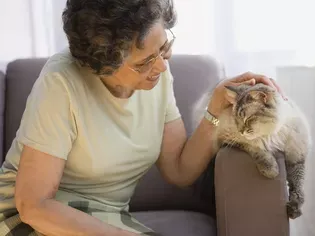Signs Your Cat Is Aging and When to See the Vet
Updated on 05/27/24

Your Beloved Feline's Golden Years: A Comprehensive Guide to Aging Signs and Veterinary Intervention
As cherished companions, our feline friends grace our lives with unconditional love and furry cuddles. However, as they embark on their golden years, it becomes increasingly important to monitor their well-being and recognize the signs that may indicate aging-related concerns. This comprehensive blog aims to empower you with the knowledge to identify these cues and determine when veterinary intervention is necessary.
Subtle Clues: Understanding Your Cat's Changing Needs
Aging in cats manifests in a myriad of ways, some more apparent than others. Here are some subtle signs that may warrant your attention:
* Decreased Activity Levels: As cats age, their energy levels naturally decline. However, excessive lethargy or a significant decrease in activity should raise a red flag.
* Changes in Grooming Habits: Cats are known for their meticulous grooming habits. If your feline friend suddenly neglects their appearance or develops matted fur, it could indicate an underlying health issue.
* Cognitive Decline: Senior cats may experience subtle changes in their cognitive abilities, such as disorientation or difficulty learning new tricks.
* Weight Loss or Gain: Unintentional weight changes can be concerning, as they may signal underlying health conditions such as kidney disease or hyperthyroidism.
Physiological Changes: When to Seek Veterinary Advice
While some aging signs are subtle, others are more apparent and necessitate veterinary attention. Here are some physiological changes that require professional evaluation:
* Dental Problems: Dental disease is a common issue in aging cats. Signs may include bad breath, drooling, or reluctance to eat.
* Arthritis: Stiffness, lameness, or difficulty jumping may indicate the onset of arthritis.
* Heart Disease: Cats with heart disease may experience shortness of breath, coughing, or lethargy.
* Kidney Disease: Kidney function declines with age, leading to symptoms such as increased thirst, urination, or weight loss.
* Cancer: Cancer is a leading cause of death in cats. While early detection is essential, symptoms may vary depending on the type of cancer.
When to Visit the Vet: Deciding When Intervention is Needed
Recognizing the signs of aging in your cat is crucial, but knowing when to seek veterinary intervention is equally important. Here's how to assess the situation:
* Sudden Changes: Abrupt changes in behavior, activity levels, or appetite should be addressed promptly.
* Persistent Symptoms: If any of the mentioned signs persist for more than a few days, it's advisable to schedule a veterinary exam.
* Concerning Symptoms: Certain symptoms, such as difficulty breathing, seizures, or severe vomiting, require immediate veterinary attention.
* Annual Check-Ups: Regular veterinary check-ups are essential for elderly cats to monitor their health and detect problems early on.
Caring for Your Aging Feline: Tips for Enhancing Quality of Life
Once your veterinarian has diagnosed any underlying health conditions, you can implement specific measures to enhance your cat's quality of life:
* Provide a Healthy Diet: Age-appropriate diets tailored to their nutritional needs are crucial.
* Exercise and Enrichment: Gentle exercise and mental stimulation keep elderly cats active and engaged.
* Pain Management: If your cat experiences discomfort from arthritis or other conditions, pain medication can provide relief.
* Dental Care: Regular dental cleanings and home dental care are essential for maintaining oral health.
* Love and Attention: Show your feline friend plenty of love, attention, and emotional support during their senior years.
Conclusion: A Cherished Journey of Companionship
As our feline companions age, their well-being becomes our top priority. By carefully observing their behavior, recognizing the signs of aging, and seeking timely veterinary intervention, we can ensure their golden years are filled with comfort, love, and cherished companionship. Remember, every cat is unique, and their aging process may vary. The key is to be attuned to their changing needs and provide the care and support they deserve throughout life's journey.
Explore More Pets

Cat Behavior Problems
How to Stop Aggression in Kittens

Long-Haired Cat Breeds
Siberian Cat: Breed Profile, Characteristics, & Care

Cat Behavior Problems
How to Stop Kittens From Scratching and Biting

Long-Haired Cat Breeds
Turkish Angora: Cat Breed Profile, Characteristics & Care

Basic Training
How to Socialize Your Kitten

Short-Haired Cat Breeds
Cute Pictures & Facts About Calico Cats & Kittens

Litter Box Training
Training Your Kitten to Use the Litter Box

Long-Haired Cat Breeds
10 Fun Facts About White Cats
